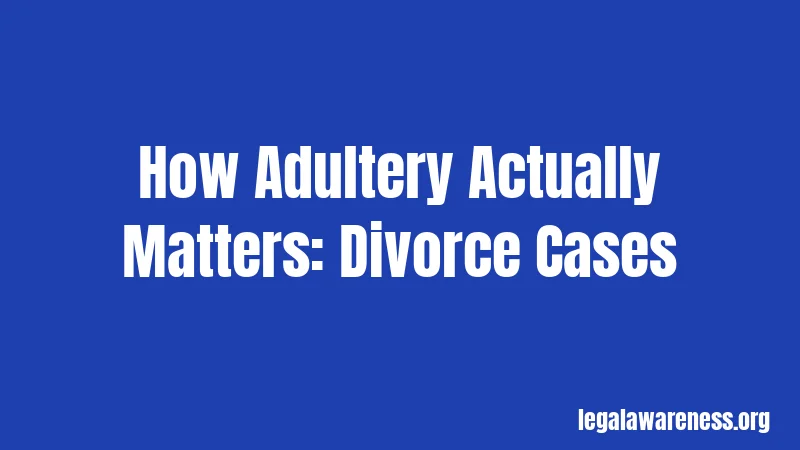Adultery Laws in Florida (2026): Still a Crime, Rarely Enforced
Most people don’t realize adultery is technically illegal in Florida. Seriously. You could get arrested for cheating on your spouse. But here’s the thing—it almost never happens.
Let me break down exactly what Florida law says. And more importantly, what actually happens in real life.
What Is Adultery in Florida?

Adultery means having sex with someone who isn’t your spouse. Pretty straightforward, right?
In Florida, the law gets more specific. It says “living in an open state of adultery” is the crime. This basically means being in an ongoing affair that’s obvious to others.
A one-time thing technically counts too. But the law focuses on people who are openly living together or openly having an affair.
Here’s something that surprises most people. Only the married person can be charged. If you’re single and sleeping with someone who’s married, you can’t be arrested under this law. The married person is the one breaking the law.
The Basic Law
Florida Statute 798.01 makes adultery a second-degree misdemeanor. This law has been on the books since 1874.
Yep, 1874.
The statute says anyone who lives in an open state of adultery is guilty. If either person is married, both can be charged if they’re living together.
Wait, it gets interesting.
Penalties for Adultery

Here’s what you could face if convicted. Up to 60 days in jail. A fine of up to $500. Or both.
That’s the maximum penalty. Most second-degree misdemeanors in Florida carry these same penalties.
But honestly, these penalties are mostly theoretical. Prosecutions are extremely rare. Like, almost never happens rare.
When Does Anyone Actually Get Prosecuted?
Wondering if this law is actually enforced?
The short answer: basically never. Legal experts across Florida say the same thing. In the last several decades, there are almost no records of adultery prosecutions.
Think about it. Thousands of people cheat on their spouses in Florida every year. How many get arrested? Virtually none.
A lawyer in Tampa told one client the law is “almost meaningless.” Another attorney said people run “very little danger” of being prosecuted.
Here’s why it’s not enforced. Proving adultery in court is difficult. The state would need solid evidence of sexual intercourse. Photos, videos, witness testimony, or confessions.
Plus, prosecutors have way bigger problems to deal with. Violent crimes, drug offenses, property crimes. They’re not wasting time on consenting adults having affairs.
You’d basically have to be extremely obvious about it. And even then, you probably won’t get arrested.
How Adultery Actually Matters: Divorce Cases

Okay, so you won’t go to jail. But adultery can still hurt you financially.
Florida is a “no-fault” divorce state. This means you don’t need to prove your spouse cheated to get divorced. You just say the marriage is “irretrievably broken” and that’s enough.
So what’s the point of mentioning adultery at all?
Money. That’s the point.
Property Division
Courts divide marital assets fairly in Florida. Usually that means splitting things equally.
But if one spouse spent marital money on their affair, the court can adjust the division. Fancy dinners with your lover? Hotel rooms? Expensive gifts? Trips together?
All of that can come back to bite you.
The court can reduce the cheating spouse’s share of assets. This basically reimburses the innocent spouse for money wasted on the affair.
Not sure what counts as wasting money? Let me explain.
If you spent $20,000 on your girlfriend while married, that’s a problem. The court might give your spouse an extra $20,000 from your share of assets.
One case involved a husband who rented an apartment for his mistress. The judge counted every penny he spent. His wife got significantly more in the divorce settlement.
Alimony Decisions
Alimony is money one spouse pays to the other after divorce. Florida courts look at many factors when deciding alimony.
One factor: adultery and its economic impact.
If the affair cost the marriage money, it matters. The cheating spouse might pay more alimony. Or the innocent spouse might receive more.
Here’s the key thing. The affair itself isn’t enough. The court needs proof of financial harm.
No financial impact? Then adultery probably won’t affect alimony much.
Child Custody and Parenting Time
This is where it gets serious.
Florida courts always put children’s best interests first. They consider each parent’s “moral fitness” when making custody decisions.
An affair can show poor judgment. Especially if the parent exposed kids to the affair. Or if they neglected their kids to spend time with their lover.
A judge might worry about stability. If you’re constantly dating new people, that’s not stable. Kids need routine and consistency.
Courts have given primary custody to the faithful spouse in some cases. The reasoning? The cheating parent showed they prioritize themselves over family.
Honestly, this is probably the biggest real consequence of adultery. You could lose time with your kids.
Special Circumstances
Military Members
Active duty military? This matters even more to you.
Adultery violates the Uniform Code of Military Justice. This is federal military law. The penalties are much more serious than Florida’s law.
You could face reduction in rank. Loss of pay. Even discharge from the military.
The military actually prosecutes adultery cases. Unlike civilian courts, they take this seriously.
During Divorce Proceedings
Hold on, this part is important.
You’re still married until the divorce is finalized. That means any relationship during the divorce is technically adultery.
Many people don’t realize this. They start dating as soon as they file for divorce. Legally, that’s still cheating.
Be careful about spending marital money on new relationships during divorce. Courts really don’t like that.
Proving Adultery
If adultery matters in your divorce, you’ll need proof.
Text messages are common evidence. Emails work too. Photos can prove a relationship exists. Credit card statements showing hotel rooms or gifts.
Social media posts have become huge evidence sources. People post everything online these days.
Private investigators are expensive but effective. They can document affairs with photos and detailed reports.
Witness testimony also works. Friends who saw the affair. Neighbors who noticed someone else living in the house.
How to Handle Adultery in Your Situation
If You’re the Faithful Spouse
Document everything. Save text messages and emails. Keep credit card statements showing suspicious charges.
Don’t delete anything your spouse sent you. Screenshots are your friend.
Talk to a divorce attorney early. They can advise you on protecting your rights. They’ll tell you what evidence matters most.
Focus on financial documentation. Show how much money your spouse spent on their affair.
If You Had an Affair
Be honest with your attorney. They can’t help you if they don’t know the truth.
Stop spending marital money on your new relationship immediately. This is critical.
Consider mediation. You might get better terms if you negotiate rather than fight in court.
Understand that you might need to compromise more. The affair gives your spouse leverage.
Other States vs. Florida
Florida isn’t the only state where adultery is technically illegal. About 15 states still have adultery laws on the books.
Some states classify it as a felony. Michigan and Wisconsin treat it more seriously than Florida.
New York just repealed their adultery law in 2024. They finally removed it after more than a century.
But here’s the pattern across all these states. Nobody prosecutes these cases anymore.
The laws exist as fossils from another era. They reflect old values about marriage and morality.
Modern prosecutors don’t care about consenting adults having affairs. They have real crimes to handle.
What About Alienation of Affection Lawsuits?
Some people think you can sue your spouse’s lover.
In Florida, you can’t. These lawsuits are called “alienation of affection” claims. Florida abolished them years ago.
Only a handful of states still allow these lawsuits. North Carolina is one. Hawaii is another.
In Florida, your only legal remedy is through divorce court. You can’t sue the other person directly.
Common Misconceptions
“Adultery guarantees I’ll win the divorce”
Not true. Florida is no-fault. You don’t need adultery to get divorced. And adultery doesn’t automatically mean you get everything.
It only matters if it caused financial harm. Or if it affects the kids.
“I can call the police on my cheating spouse”
Technically yes. Practically? They won’t care.
Police aren’t going to arrest someone for adultery. They’ll tell you it’s a civil matter. They’ll suggest you get a divorce lawyer.
“Adultery means I pay no alimony”
Nope. Courts still look at all the factors. Your income, your spouse’s income, length of marriage, standard of living.
Adultery is just one factor among many.
Recent Developments
The law hasn’t changed in decades. Florida Statute 798.01 remains exactly as written.
But social attitudes have changed dramatically. Most people don’t think adultery should be a crime.
Some legal experts think Florida will eventually repeal the law. New York just did it in 2024. Other states are considering it.
For now, it stays on the books. But it’s essentially dead letter law.
Frequently Asked Questions
Can I actually go to jail for adultery in Florida?
Technically yes, but it won’t happen. The maximum is 60 days in jail and a $500 fine. But prosecutions are virtually nonexistent. You’re far more likely to face consequences in divorce court than criminal court.
Does my spouse need to prove I had an affair to divorce me?
No. Florida is a no-fault divorce state. Your spouse only needs to say the marriage is irretrievably broken. They don’t need to prove adultery or any other specific reason.
Can adultery affect how much alimony I pay or receive?
Yes, if the affair had financial impact. Courts consider whether adultery caused economic harm to the marriage. If you spent thousands on your affair partner, you might pay more alimony or receive less.
Will cheating affect custody of my kids?
Possibly. Courts look at moral fitness when deciding custody. If your affair showed poor judgment or affected your parenting, it could impact custody decisions. Exposing kids to the affair or neglecting them makes it worse.
Can I sue the person my spouse cheated with?
No. Florida abolished alienation of affection lawsuits. You cannot sue your spouse’s affair partner for damages. Your only legal option is addressing it through divorce proceedings.
Final Thoughts
Adultery is technically illegal in Florida. But the criminal law is basically ignored.
The real consequences happen in divorce court. Financial penalties, less alimony, reduced custody time with kids.
If you’re going through this, get a good lawyer. Document everything. And stop spending marital money on affairs.
Stay informed, protect yourself, and make smart decisions during this difficult time.
References
- Florida Statute § 798.01 – Living in Open Adultery (https://www.leg.state.fl.us/statutes/index.cfm?App_mode=Display_Statute&URL=0700-0799/0798/Sections/0798.01.html)
- Florida Statute § 775.083 – Fines for Misdemeanors (https://www.leg.state.fl.us/statutes/index.cfm?App_mode=Display_Statute&URL=0700-0799/0775/Sections/0775.083.html)
- Florida Statute § 61.08 – Alimony Factors (https://www.leg.state.fl.us/statutes/index.cfm?App_mode=Display_Statute&URL=0000-0099/0061/Sections/0061.08.html)
- Florida Statute § 61.075 – Equitable Distribution of Marital Assets (https://www.leg.state.fl.us/statutes/index.cfm?App_mode=Display_Statute&URL=0000-0099/0061/Sections/0061.075.html)
- Florida Statute § 61.13 – Child Custody Factors (https://www.leg.state.fl.us/statutes/index.cfm?App_mode=Display_Statute&URL=0000-0099/0061/Sections/0061.13.html)
